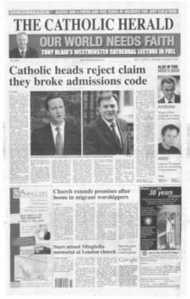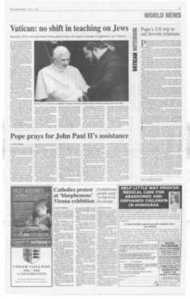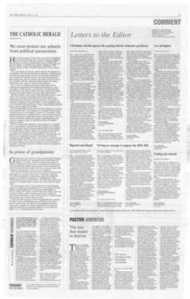Page 10, 11th April 2008
Page 10

Report an error
Noticed an error on this page?If you've noticed an error in this article please click here to report it.
Tags
Share
Related articles
The Pope In His Own Words
Analysis: How The Church Greeted The Election Of Pope...
America Gives Pope A Rapturous Welcome
Save Us From The Clichés About Benedict
Priests Must Be Shepherds To Their Flock, Says Pontiff
Benedict XVI brings an audacious hope to America
Freddy Gray says the Pope's first trip to the US is a spiritual rather than a political mission 0n Tuesday, April 15, a plane carrying Pope Benedict XVI will land at Andrews Air Force Base. Inside the aircraft, the pontiff, a quiet some say shy old man, will brace himself for perhaps the busiest and most important few days of his life.
It is obviously significant, at least symbolically. when the world's foremost religious leader makes a pilgrimage to the most powerful nation on the planet. For this pope, however, at this juncture of history, the trip could be especially momentous. Americans, their economy seemingly collapsing and their military hopelessly entangled in two unending and staggeringly expensive wars, might be particularly receptive to the philosophical insights of an outsider. At any rate, his arrival will offer a brief distraction from the endless media coverage of the presidential elections. For the Vatican, on the other hand, Pope Benedict's East Coast tour provides a unique opportunity for the Catholic Church to preach to the world.
What then will Benedict say to America? It is well-known, of course, that he has been a fierce and consistent opponent of the Iraq war from its beginning. Will he launch a broadside against the Bush administration's foreign policy? Catholic pundits think it unlikely, especially during a presidential election campaign.
Many anti-war Catholics will be hoping that Benedict uses his visit to America to attack the other side of the perceived civilisational conflict. They want him, for instance, to remonstrate against mass consumerism, rampant free enterprise, and the neo-conservative agenda for global democratic revolution. They may not be disappointed. Benedict's speeches and homilies in Washington and New York are likely to reflect the themes of his forthcoming social encyclical, which is expected to be published on May 1. The document may touch on subjects that make many conservatives blush. It has long been rumoured that the text will contain a landmark statement about global warming. Obviously references to the environment would be about man's role as steward of creation, rather than man's duty to worship trees. Still, this is hardly what one would have expected three years ago from the world's bestknown traditionalist Catholic.
In a similar context, Benedict XVI will probably also discuss the Church's commitment to "social justice" a term so successfully hijacked by the Catholic Left that it now seems synonymous with socialism. This argument will extend to the Vatican's opposition to aggressive global capitalism, rootless individualism, and corporate avarice. These are western vices, and ones that afflict America as much as they do Europe.
It takes only a short intellectual hop and a skip to understand how Benedict's condemnation of boundless profiteering is connected to his opposition to the Iraq war. For him, the pursuit of wealth is well and good but should be tempered by the Christian obligations to help the poor and reject worldly treasures. Equally. the spread of democracy, while ostensibly a desirable development, must be accompanied by a commitment to peace and a respect for the rights of others to determine their own way of life.
In Pope Benedict's mind, the Bush administration's attempt to impose democracy in Iraq was gravely wrong. He has repeatedly denounced the war. When asked in 2002 if he considered the invasion just, the then Cardinal Ratzinger answered: "Certainly not... the damage would be greater than the values one hopes to save." On Palm Sunday of this year, just days after a Chaldean archbishop was murdered in northern Iraq, Benedict thundered: "Enough with the slaughters, enough with the violence, enough with the hatred in Iraq!" The angry remark was surely not simply a rebuke aimed at the archbishop's executioners but a reprimand of all the parties the US foremost among them who are responsible for the bloodshed.
Any criticism of the United States would, however, almost certainly be outweighed by praise. Benedict XVI is clearly impressed by the vitality of Christianity in America. The signs of life in Catholic America are obviously encouraging to Benedict. In 1992 he told the journalist Peter Seewald: "American Catholicism has nowadays become one of the determinative factors in the universal Church. The Church in America is very dynamic."
The prime mission of his papacy, Catholic experts now agree, is to rescue the West from godlessness and the moral relativism that goes with it. America, the only country that has combined First World material progress with sustained public faith, offers important clues as to how this can be done. There still remains, however, the knotty question of how Catholicism's fundamental opposition to relative morality can be squared with the democratic, and very American, principle that one mans beliefs are as good as another's.
Of course, saving the West is not how the Pontiff's agenda is understood in liberal sections of the media. In the March issue of The Atlantic, Alan Wolfe writes: "Pope Benedict's decision to steer Catholicism in a more traditional direction a move that effectively forfeits the Church's future in the developed world in order to expand its appeal in developing regions seems like a winner only in the short run." Wolfe is wrong. Rome is not, as he suggests, giving up on the West to focus on the Third World. Quite the opposite. Benedict XVI was probably elected precisely because he is a European. After John Paul ll's death in 2005, pundits predicted that the next pope would be an African or a Latin American. Instead they got a German intellectual who offered a unique response to the secularist challenge to Catholicism.
Cardinal Ratzinger is thought to have chosen his papal name in honour of St Benedict, the founder of the monastic order that re-energised the evangelisation of Europe. Benedict XVI has visited Poland, Germany, France, Turkey, and rapidly modernising Brazil. In addition to his venture in America, he will also go to Australia in 2008. It is clear that Pope Benedict's priority is to fight the growing secularism of the developed world. And to do that, he needs America's loyal army of Christian soldiers, both Catholic and Protestant.
That said, American religiosity is very far from conforming to what the Pope would consider the Christian ideal. A recent Pew survey found that Americans switch religion almost as readily as they move home. Most worryingly for Rome. one in every10 US citizens is a lapsed Catholic. Among those who do practise, there is an energetic and devout core of faithful followers, yet many self-described Catholics make little attempt to live their lives according to the teachings of their Church. Benedict XVI naturally finds this lax approach to the faith disturbing. Before he became pope, Joseph Ratzinger said that he would rather the Church was a smaller community of devout believers than a large mass of vague and uncommitted Christians.
Yet Benedict's message to Americans will not be pessimistic. This is a pope whose last encyclical was entitled Saved in Hope. And it is quite possible that he thinks of America, despite all its flaws and foreign policy failings. as still the last best hope of earth.
This is an abridged version of an article that first appeared in The American Conservative (www.amconmag.com)
blog comments powered by Disqus

















